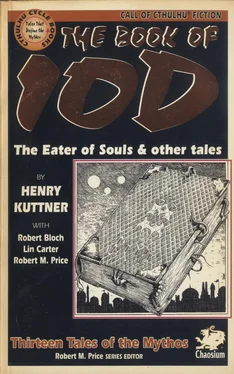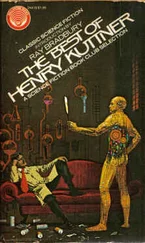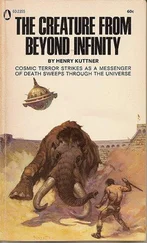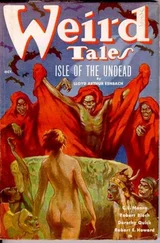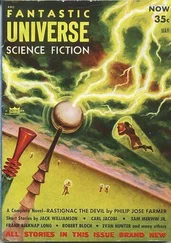Henry Kuttner - The Book of Iod
Здесь есть возможность читать онлайн «Henry Kuttner - The Book of Iod» весь текст электронной книги совершенно бесплатно (целиком полную версию без сокращений). В некоторых случаях можно слушать аудио, скачать через торрент в формате fb2 и присутствует краткое содержание. Год выпуска: 1995, ISBN: 1995, Издательство: Chaosium, Жанр: Ужасы и Мистика, на английском языке. Описание произведения, (предисловие) а так же отзывы посетителей доступны на портале библиотеки ЛибКат.
- Название:The Book of Iod
- Автор:
- Издательство:Chaosium
- Жанр:
- Год:1995
- ISBN:9781568820453
- Рейтинг книги:5 / 5. Голосов: 1
-
Избранное:Добавить в избранное
- Отзывы:
-
Ваша оценка:
- 100
- 1
- 2
- 3
- 4
- 5
The Book of Iod: краткое содержание, описание и аннотация
Предлагаем к чтению аннотацию, описание, краткое содержание или предисловие (зависит от того, что написал сам автор книги «The Book of Iod»). Если вы не нашли необходимую информацию о книге — напишите в комментариях, мы постараемся отыскать её.
The Book of Iod — читать онлайн бесплатно полную книгу (весь текст) целиком
Ниже представлен текст книги, разбитый по страницам. Система сохранения места последней прочитанной страницы, позволяет с удобством читать онлайн бесплатно книгу «The Book of Iod», без необходимости каждый раз заново искать на чём Вы остановились. Поставьте закладку, и сможете в любой момент перейти на страницу, на которой закончили чтение.
Интервал:
Закладка:
To this view he clung, in spite of what he had seen the night before creeping toward him in the moonlit garden. The villagers could not know that Hartley dared not accept the monstrous theories which they had advanced during the trip to the witch- house, nor that Hartley held to his skepticism as the last bulwark of his sanity.
“I dare not believe,” the artist told himself desperately. "Such things are impossible.”
“An animal of some sort,” he insisted, in answer to a comment by Byram Liggett, the stocky, bronze-faced farmer who had rescued him. “I’m sure of that. Some carnivorous animal—”
Liggett shook his head dubiously, his gun—for all the men had come fully armed—held in readiness as his eyes furtively searched the surrounding vegetation. “No, sir,” he said firmly. “Don’t forget, I saw it. That thing wasn’t like nothin’ God ever created. It was —her—come up out of her grave.”
Involuntarily the group shrank back from the charnel pit.
“All right, a—a hybrid, then,” Hartley argued. “A sport—a freak. The product of a union between two different kinds of animals. That’s possible. It’s simply a dangerous wild animal of unusual type—it must be!”
Liggett looked at him oddly, and was about to speak when there came an interruption in the person of a youth who ran panting up, white-faced and gasping.
A premonition of disaster came to Hartley. “What’s happened?” he snapped, and the boy tried to control his hurried breathing until he could speak coherently.
“Ol’ Anam—an’ Miss Pickering,” he gasped out at last. “Suthin’s killed ’em! All—all tore to pieces they was—I saw 'em—”
At the memory a shudder shook the boy, and he began to cry from sheer terror.
The men looked at one another with blanched faces, and a little murmur began, grew louder. Liggett raised his arms, quieted them. There were little beads of moisture on his brown face.
“We got to get back to town,” he said tensely. “An’ in a hurry, too. Our women-folks an’ kids—”
As a thought came to him, he turned again to the boy. “Jem,” he asked sharply. “Did you notice—were there any tracks at Anam’s place?”
The boy choked back his sobs. “There—yes there was. Great big things, like frog tracks, only big as my head. They—”
The harsh, urgent voice of Liggett interrupted. “Back to town, everybody. Quick! Git your women an’ younsters indoors, an’ keep 'em there.”
At his words the group broke and scattered, moving hastily away until Liggett and Hartley were left. Hartley was very pale as he stared at the farmer.
“Surely this—this is unnecessary,” he said. “A few men—with guns—”
“You damn fool!” Liggett snapped, his voice rough with restrained anger. “Movin’ the Witch Stone—you shouldn’t been ‘lowed to rent the place anyway. Oh, you city folks are smart, I guess, with your talk o’ freaks an’—an’ sports—but what do you know ‘bout what used to happen in Monk’s Hollow hundreds o' years ago?
“I’ve heard ‘bout those times, when devils like Persis Winthorp had their conjures an’ pagan books here, an’ I’ve heard tell o’ the awful things that used to live in the North Swamp. You’ve done enough harm. You better come with me—you can’t stay here. Nobody’s safe till we do something ‘bout—that!"
Hartley made no answer, but silently followed Liggett back to the road.
On their way they passed men hurrying townward, bent oldsters hobbling along, casting frightened glances about them, women with wide-eyed children whom they kept close about their skirts. A few automobiles drove slowly past, and a number of old-fashioned buggies. The telephones had been busy. Occasionally Hartley caught furtive whispers, and as they drew nearer to town the number of fugitives increased, and the whispers grew and swelled into low, terror-laden mutterings, drumming into Hartley’s ears like the doom-laden pounding of a great drum.
“The Frog! The Frog! "
Night came. Monk’s Hollow lay sleeping in the moonlight. A number of grim, armed men patrolled the streets. Garage doors were left open, in instant readiness to rush aid in answer to a telephoned appeal for help. There must be no more tragedies like that of last night.
At two in the morning Liggett had been jerked from an uneasy sleep by the frantic ringing of the telephone. It was the proprietor of a gasoline station on the highway several miles beyond the town. Something had attacked him, he shrieked into the instrument. He had locked himself within the station, but its glass walls would offer little protection against the thing that was even then creeping closer.
But help arrived too late. The station was an inferno of flame that fed on the underground gasoline reservoirs, and the men had only a glimpse of a great misshapen thing that bounded from the holocaust to escape apparently unscathed amid the hail of hasty bullets that greeted its appearance.
But the proprietor of the station had, at least, died a clean death; he had been cremated, for some of his bones, unmarked by gnawing fangs, were later found among the ruins.
And that night Hartley had found monstrous tracks beneath the window of his room in Liggett’s house. When he showed them to Liggett, the farmer had stared at him with a curious light in his eyes, but had said little.
The next attack came the following night. Hartley had fled from his bedroom and slammed the door just in time to escape the thing that clawed and slobbered and bellowed at the thin panel. But before Hartley and the aroused Liggett could return with their guns it had taken fright and escaped through the shattered window.
Its tracks led into a patch of thick underbrush nearby, but to enter that tangled wilderness of shadow at night would have been sheer suicide. Liggett had spent half an hour at the telephone, arranging for the villagers to meet at his house at dawn to begin the pursuit. Then, since they could not sleep, the two men returned to Hartley’s bedroom and talked until nearly dawn.
“It’s marked you down,” Liggett said. “It’s after you, like I thought. I figgered—.” He hesitated, scratching the stubble on his chin. “I figgered that maybe we could trap it—”
Hartley caught his meaning. “Using me for bait? No!”
“What else can we do? We’ve tried to track it, but it hides in the North Swamp by day. It’s the only way, unless you want it to kill more people. You can’t keep kids indoors all the time, Hartley.”
“The National Guard—,” Hartley began, but Liggett interrupted him.
“How can they git it there in the swamp? If the thing could be got by ord’nary means we’d have done it. We’ll track it, come dawn, but it won’t do any good. Don’t you see, man, every minute counts? Even while we’re talking here the thing may be butcherin’ somebody. Don’t forgit—.” He broke off, eyeing Hartley.
"I know. You think I started it. But—God! I’ve told myself over and over that the thing’s a freak, some hellish outcome of an unnatural mating. But—”
“But you know that’s not so,” Liggett said quietly. “You know what it is.”
“No.” Hartley shook his head dully. “It can’t—”
He stopped, staring at Liggett’s face. The farmer was glaring past Hartley’s shoulder, incredulous horror in his eyes. He cried out a startled warning, sent Hartley spinning with a sudden push. The artist had a glimpse of a shining hideous countenance protruding through the window; a dreadful mask that was neither batrachoid nor human, but partook monstrously of the attributes of both. A great slit-like mouth worked loosely, and yellow, glazed eyes glared into Hartley’s; there was a choking stench of foul corruption, and the thing was in the room. Liggett’s gun blasted.
Читать дальшеИнтервал:
Закладка:
Похожие книги на «The Book of Iod»
Представляем Вашему вниманию похожие книги на «The Book of Iod» списком для выбора. Мы отобрали схожую по названию и смыслу литературу в надежде предоставить читателям больше вариантов отыскать новые, интересные, ещё непрочитанные произведения.
Обсуждение, отзывы о книге «The Book of Iod» и просто собственные мнения читателей. Оставьте ваши комментарии, напишите, что Вы думаете о произведении, его смысле или главных героях. Укажите что конкретно понравилось, а что нет, и почему Вы так считаете.
